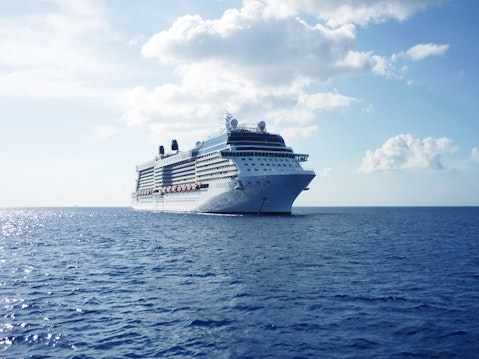In this article, we will discuss the 10 Worst Cruise Stocks to Buy Now According to Short Sellers.
The cruise industry accelerated after taking a significant hit during the COVID-19 pandemic. As per the Cruise Lines International Association (CLIA), ~35.7 million passengers are anticipated to set sail in 2024. This translates to 6% growth as compared to 2019. JP Morgan Research highlighted that major cruise lines enjoyed a successful 2024 wave season between January and March when operators provided the best deals. CLIA highlighted that, in 2023, the passenger volume touched a record 31.7 million, exhibiting a rise of 7% over 2019 levels.
Wall Street experts believe that travel exchange-traded funds (ETFs) are well-placed to soar on the back of a resurgence in consumer demand for travel-related activities, supported by post-pandemic recovery and changing consumer behaviors. Amidst some short-term challenges, the long-term outlook for the travel sector is positive as a result of demographic shifts and an increased preference for experiential spending.
Positive Demographic Shifts Should Be a Primary Growth Enabler
Earlier, Baby Boomers used to make up the core consumer base for the broader cruise industry. Today, however, an increased number of younger travelers continue to come on board. As per CLIA, ~73% of Millennials and Gen X travelers mentioned that they would consider a cruise vacation. Also, a renowned cruise company has recently mentioned that half of its cruise customers are Millennials or younger. This is because of rising affluence. Moreover, according to the bank’s research, the spending capacity of Millennial customers has seen an increase of ~49% since 2019. Today, the average net worth of an individual aged 40 or under sits at ~$259K.
The cruises continue to attract more first-time passengers. The cruise companies are seeing “new-to-cruise” in their 2025 bookings, with this customer category rising by more than 30% versus a year ago.
The bank believes that cruise operators are improving and modernizing their offerings to make them appealing and highlighted that key operators continue to invest in new hardware, notably mega-ships and private destinations. This has been driving more eyeballs to the broader cruise and tourism industry, accelerating new-to-cruise acquisition. CLIA recently highlighted that the cruise industry has been deploying billions in new ships and engines which give flexibility to use low to zero-GHG fuels with little to no engine modification.
Cruises Over Land-based Activities
According to a survey by the bank’s research division held in April, only ~29% of respondents have excess savings. Notably, ~45% of the respondents are expected to spend less in discretionary categories over the upcoming 12 months. This implies an increased cautious behavior even in the environment of moderating inflation.
This scenario is placing cruise voyages, that are cheaper than land-based vacations, in a strong position. Consumers are focused on value within discretionary categories. The value spread between cruises and land-based alternatives stood at 25%-30% today as compared to 10%-15% pre-pandemic. Despite higher inflation, cruise lines continue to focus on improved experiences, without compromising quality or service. This should further enhance their value.
Despite a tough consumer spending environment, both ticket and onboard prices increased over the past few months. This means that the demand backdrop is strong for the overall cruise industry. The bank’s research shows that more than 85% of tickets have been booked for 2024, with a focus now turning to 2025 and bookings already exceeding historical levels. Moreover, the industry should grow revenues by high-single digits over the upcoming 5 years, tapping ~3.8% of the global vacation market by 2028.

Our methodology
To list the 10 Worst Cruise Stocks to Buy Now According to Short Sellers, we used a Finviz screener to filter out stocks catering to the cruise business. Next, we narrowed our list of stocks by selecting the ones having high short interest. Finally, the stocks were ranked in ascending order of their short interest.
Why are we interested in the stocks that hedge funds pile into? The reason is simple: our research has shown that we can outperform the market by imitating the top stock picks of the best hedge funds. Our quarterly newsletter’s strategy selects 14 small-cap and large-cap stocks every quarter and has returned 275% since May 2014, beating its benchmark by 150 percentage points (see more details here).
10 Worst Cruise Stocks to Buy Now According to Short Sellers
10) Viking Holdings Ltd (NYSE:VIK)
Short % of Float (As of 15 August): 2.13%
Number of Hedge Fund Holders: 41
Viking Holdings Ltd (NYSE:VIK) operates as a holding company. The company, with the help of its subsidiaries, specializes in offering offshore recreational travel services by cruise vessels.
Short sellers continue to be bearish about Viking Holdings Ltd (NYSE:VIK) after its 2Q 2024 results. The company’s net income saw a fall to $155.8 million, or 37 cents a share, from $189.93 million, or 46 cents a share, in the same quarter of the previous year. FactSet estimated earnings of 67 cents a share. Viking Holdings Ltd (NYSE:VIK)’s revenue increased by 9% to $1.59 billion from $1.45 billion in the year-ago quarter, marginally missing the analyst estimates of ~$1.6 billion. Also, short sellers opine that the company’s short-term obligations continue to exceed its liquid assets, which might impact its balance sheet health moving forward.
On the other hand, Wall Street analysts are quite optimistic about the growth prospects of Viking Holdings Ltd (NYSE:VIK). They opine that the company’s unique position in the cruise industry, considering its emphasis on a pure-play luxury profile, should continue to act as a growth enabler. This might contribute to its robust pricing momentum. Wall Street believes that the company should achieve above-industry revenue and EBITDA growth in the upcoming years. This growth is expected to stem from its significant capacity growth and yield growth which surpasses industry averages.
Viking Holdings Ltd (NYSE:VIK)’s healthy brand recognition and advantage of long booking lead-times should also aid in achieving this outlook.
Analysts at Stifel Nicolaus upped their target price on the shares of Viking Holdings Ltd (NYSE:VIK) from $37.00 to $39.00, giving the a “Buy” rating on 23rd August. As of 2Q 2024, 41 hedge funds, holding a combined investment of $936.2 million, are bullish on the stock, as per Insider Monkey’s database.
9) Travel + Leisure Co. (NYSE:TNL)
Short % of Float (As of 15 August): 4.42%
Number of Hedge Fund Holders: 37
Travel + Leisure Co. (NYSE:TNL) focuses on offering vacation ownership, managed rental, and exchange services, and owns vacation resorts and exchange properties. The company’s comprehensive cruise coverage allows users to get the newest ships, the best deals, and the most exciting itineraries on the high seas.
The company’s Travel and Membership revenue saw a fall of 1% to $177 million in 2Q 2024 as compared to the same period in the previous year. This was mainly because of a 4% decline in transactions. Moreover, Travel + Leisure Co. (NYSE:TNL) expects that loan loss provisions would be ~100 basis points higher than the expectations. Also, short sellers believe that higher total expenses might weigh over the company’s margins and profitability scenario over the long term. In 2Q 2024, Travel + Leisure Co. (NYSE:TNL)’s total expenses were $796 million, up from $766 million in 2Q 2023.
On the other hand, Wall Street analysts believe that Travel + Leisure Co. (NYSE:TNL) should see strong growth in its vacation ownership business. The company continues to focus on expanding in the Asia-Pacific market and plans to offset increased loan loss provisions with the help of improved core timeshare business performance.
Moreover, the company is expected to benefit from the recent acquisition of the vacation ownership business of Accor. Travel + Leisure Co. (NYSE:TNL) believes that the acquisition will be immediately accretive to its earnings. Also, the acquisition has increased the international portfolio of the company.
Analysts at JPMorgan Chase & Co. initiated coverage on the shares of Travel + Leisure Co. (NYSE:TNL) and increased their price objective from $53.00 to $63.00. They gave an “Overweight” rating on 19th July. As of the end of 2Q 2024, 37 hedge funds held stakes in Travel + Leisure Co. (NYSE:TNL), up from 34 in the preceding quarter.
8) Expedia Group, Inc. (NASDAQ:EXPE)
Short % of Float (As of 15 August): 6.52%
Number of Hedge Fund Holders: 56
Expedia Group, Inc. (NASDAQ:EXPE) offers online travel services for leisure and small business travelers. The company, through its subsidiary, also provides a variety of services, such as cruise vacations, all-inclusive resorts, coach and rail tours, vacation packages, and other related services.
Short sellers believe that the near-term growth trajectory for the company remains uncertain as Expedia Group, Inc. (NASDAQ:EXPE) struggles to improve growth and raise traffic at two of the core brands (i.e., Vrbo and Hotels.com). In early May 2024, Vrbo saw slower rebound than its expectations after a restructuring targeted at enabling customers to book throughout brands under a single platform. The company’s Vrbo brand might continue to see subdued growth as a result of shifts in travel patterns and legacy market share issues.
As per short sellers, Expedia Group, Inc. (NASDAQ:EXPE) continues to see moderating travel growth, with cash-strapped consumers becoming cost-conscious. They are now focusing on “value play” vacations.
On the other hand, Wall Street analysts believe that Expedia Group, Inc. (NASDAQ:EXPE)’s migration to a unified platform between 2020-23, which shares data, supply, and loyalty (OneKey) throughout its brands, should continue to support its network advantage. The company’s investments in loyalty, user experience, and alternative accommodations which were sourced as a result of cost-cutting initiatives should continue to drive growth over the long term.
Wall Street appears to be more optimistic about the company’s B2B segment. This business has seen consistent growth over the previous 5 years and has a distinct nature from its consumer business, driven by loyalty use cases, international markets, and corporate travel. Given the strong hotel supply, distribution of products, and technology, Expedia Group, Inc. (NASDAQ:EXPE) focuses on capturing more of the $1.2 trillion addressable market. The company plans to make investments in supply and technology, which should help strengthen the market position.
Analysts at Susquehanna upped their target price on the company’s shares from $125.00 to $145.00, giving it a “Neutral” rating on 12th August. As per Insider Monkey’s 2Q 2024 data, 56 hedge funds reported owning stakes in the shares of Expedia Group, Inc. (NASDAQ:EXPE).
Artisan Partners, an investment management company, released its second quarter 2024 investor letter. Here is what the fund said:
“Expedia Group, Inc. (NASDAQ:EXPE) shares declined 18% during the quarter after reducing its full-year outlook. It lowered its revenue growth forecast to mid- to high-single digits for 2024 and said margins will stay flat. On the surface, a business growing in the high-single digits while maintaining profitability isn’t bad. The issue is the company just completed a major restructuring that was supposed to result in accelerated revenue growth and significant margin expansion. Neither is happening. The company continues to underperform the industry and its peers. Importantly, management will not share with us the important metrics and disclosures that might give us the ability to understand why. It continues to just tell us that improvement is coming. That is not enough for us, and we have lost confidence that the changes will have the intended impact on the company’s financial performance. As a result, we decided to exit the investment at a modest profit.”





